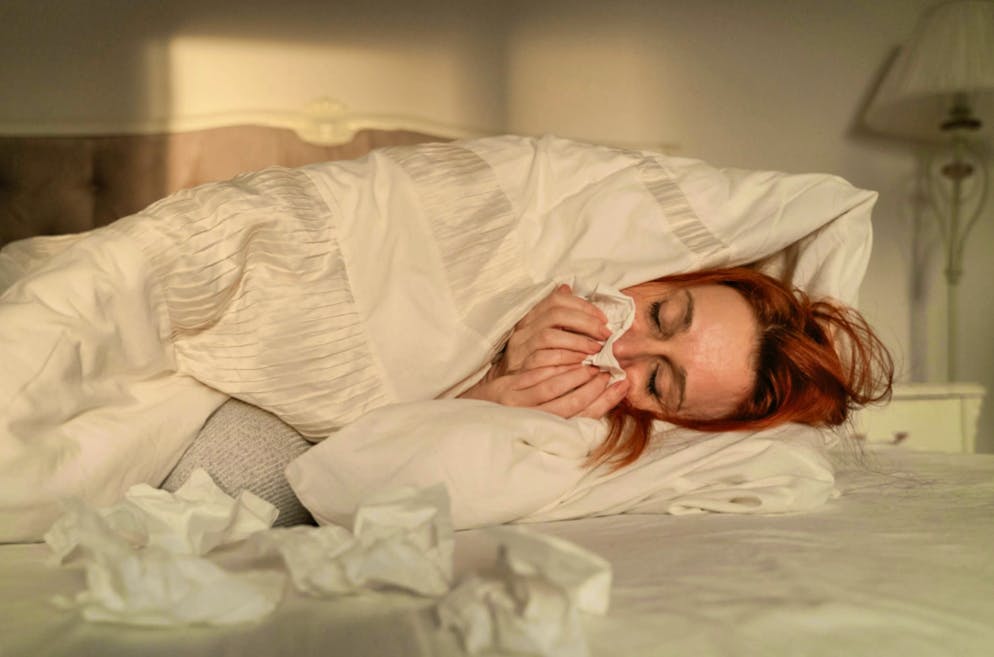Check out 5 cold myths You get sick when your hair is wet outside - is that true?
Vanessa Büchel
8.10.2024

If you don't blow-dry your hair before you leave the house, you will catch a cold. This belief has always held strong. But is it actually true? blue News does the cold myth check for you.
No time? blue News summarizes for you
- There are a number of myths surrounding the common cold. For example, that you shouldn't leave the house with wet hair because you'll get sick.
- However, this does not directly lead to a cold. Although cold does weaken the mucous membranes, making it easier for viruses to penetrate.
- Cold alone does not cause colds. People just catch them more often in winter because they are closer together in closed rooms, where viruses spread more easily.
- In addition, dietary supplements and hot lemon water do not offer any significant protection against colds.
"Something's really going around at the moment" is a phrase you've probably been hearing more often recently. Autumn is plagued by a wave of colds - and winter is still to come. So what do you need to bear in mind if you don't want to fall ill?
What your parents have probably told you: If you leave the house with wet hair, you'll catch a cold. It's probably like a mantra that's stuck in your head. But you've probably also wondered whether it's true or whether it's just humbug that you can catch the flu if you don't blow-dry your hair. blue News does a fact check on cold myths.
You can catch a cold with wet hair
🤧
All-clear: You can leave the house with wet hair in the morning if you're stressed and don't have time to blow-dry it. Because this is actually just a myth.
It is true that the risk of catching a cold increases if you go out into the cold air with wet hair, but it won't make you ill directly. This is because you only catch a cold from viruses and bacteria, not from cold outside temperatures. So if there are no pathogens present, you can't get sick.
However, if your head is cold, this means that the mucous membranes are no longer supplied with sufficient blood. The mucous membranes protect our body from pathogens and if they are not sufficiently supplied, viruses and bacteria can penetrate more easily.
Only those who dress warmly stay healthy
🧣
Even if the term itself suggests it: Cold does not promote a cold. As mentioned above, colds are caused by viruses and bacteria and not by low temperatures, although significantly more people are ill in winter than in summer.
Dr. Sorana Segal-Maurer, head of the Dr. James J. Rahal Jr. Division of Infectious Diseases at NewYork-Presbyterian Queens Hospital, explains this phenomenon to CNN: "When the weather gets cold, we all run inside where the air is recycled. And we're often in close quarters with other people and viruses. We're all sneezing on top of each other."
The pathogens are transmitted via droplets and aerosols. The latter are small droplets floating in the air. When someone coughs or sneezes, but also simply talks or breathes, viruses and bacteria are dispersed in the air. Others then breathe them in and become infected.
Cold showers keep you healthy
🚿
As the German press agency Deutsche Presse-Agentur writes, according to the Health Knowledge Foundation, there is too little scientific movement to be able to make generalized statements that people who take cold showers are less likely to fall ill.
However, a Dutch research group tackled the issue as part of a study and had some of the 3,000 test subjects shower with cold water for 30, 60 or 90 seconds a day. In the end, there was "no significant group effect".
However, Prof. Dr. med. Johannes Scherr, Chief Physician and Head of the University Center for Prevention and Sports Medicine at the Balgrist University Hospital in Zurich, confirms in an interview with the Health Knowledge Foundation that cold showers can have a positive effect on the immune system: "Alternating hot and cold showers certainly has a positive effect. As studies have already shown, it strengthens the immune system, is good for the blood vessels, skin and hair and even helps to burn fat."
Hot lemon water helps fight colds
🍋
A healthy diet rich in vitamins is good for the body. However, the fact that hot water with lemon is supposed to be a miracle cure for colds is just a myth that many people believe in. Although it has been proven that vitamin C - in high doses and taken over a long period of time - can reduce the average duration of illness by half a day to a day, it cannot prevent colds completely.
However, as lemon contains comparatively little vitamin C and some of it is lost when heated, the "hot lemon" doesn't really help.
Dr. Michael Russo, a specialist in pediatric infectious diseases at the Children's Hospital of Philadelphia, tells CNN that parents are better off saving their money. Supplements and vitamins have never been shown to have "any effect on prevention."
Men suffer more from the flu
🙅🏻♂️
It is a widespread myth that men have a harder time with the flu than women. We are talking about men's flu. Men are known to suffer a lot from it, women often smile.
Scientists at the University of Innsbruck wanted to investigate this and examined 113 men and women with a cold. They assessed their symptoms and asked the test subjects to rate how much they were suffering from the flu. The results showed that although men recover less quickly, they are no more distressed than women.
According to Geo magazine, the fact that women recover more quickly is due to the fact that their bodies contain more oestrogen. It ensures that the multiplication of antibodies is stimulated.

